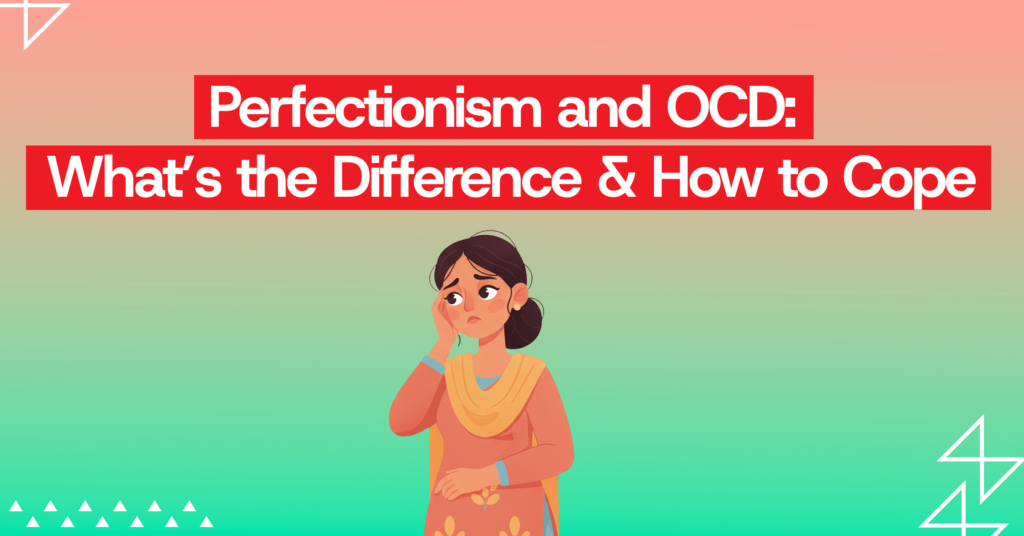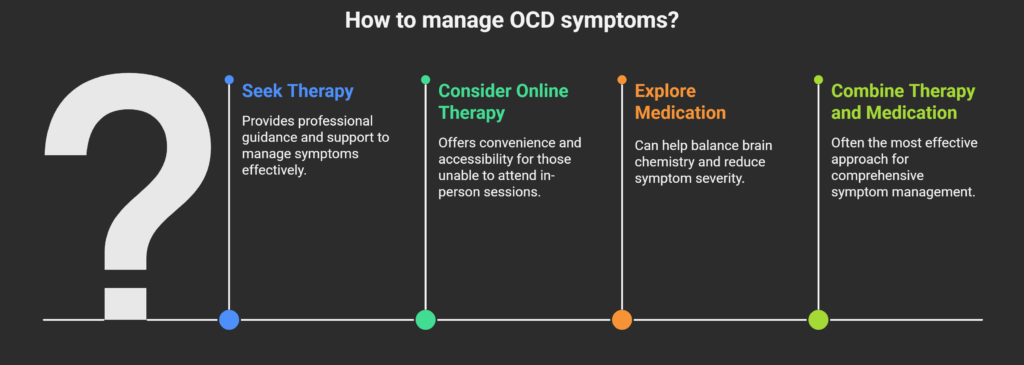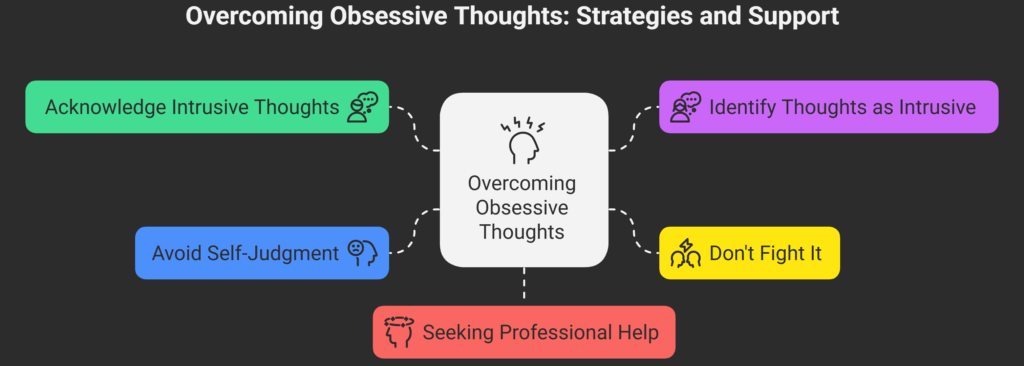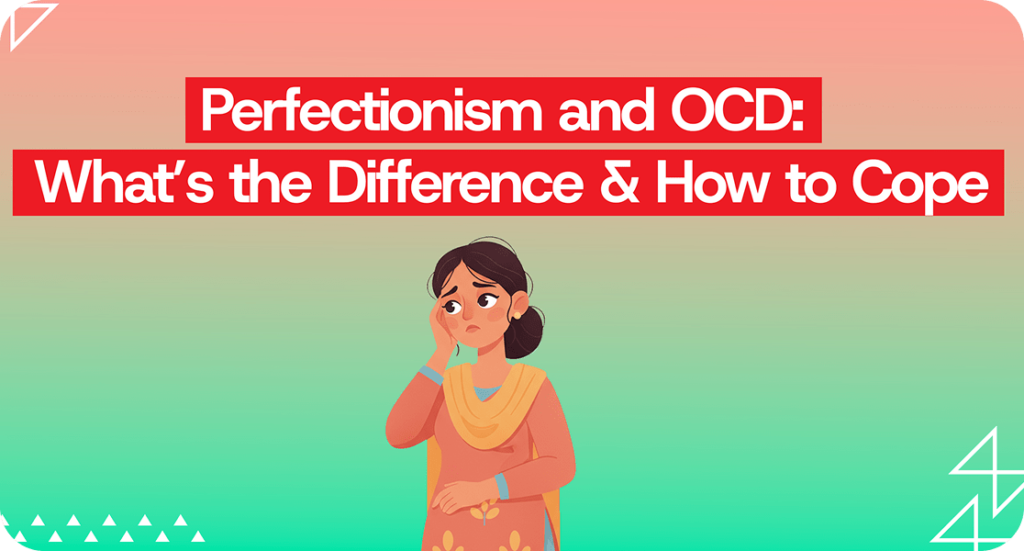
Obsessive-Compulsive Disorder (OCD) is a subject that is frequently stigmatized and trivialized in societal discourse, rather than being addressed with the gravity it warrants.
The intertwined nature of OCD and perfectionism can lead to inadequate mental health support if not properly distinguished. Furthermore, a lack of accurate understanding of perfectionism and OCD can have far-reaching consequences for mental health outcomes.
Need to Talk to Someone?
Book a private online session with a licensed therapist
Read more to learn accurately about perfectionism and OCD.
Difference Between Perfectionism & OCD
Are you someone who carries out your daily routines in an orderly and precise manner?
Are you particular about keeping your keyboard, desk, and everything else spotlessly clean?
In most cases, individuals who arrange things in an orderly and precise manner, and those who insist on cleanliness and precision in such matters, are categorized as OCD. However, it is crucial to understand the distinction between perfectionism and OCD accurately.
- Perfectionism is a characteristic of one’s personality or a personality trait, whereas Obsessive-Compulsive Disorder (OCD) is a distinct mental health condition classified under anxiety disorders.
- Perfectionists are characterized by their propensity to engage in activities with meticulous attention to detail and orderliness.
- They operate with a clear sense of purpose and direction. However, in certain situations, this excessive need for precision can have detrimental effects on functioning. Failure to meet these expectations can result in minor discomfort. Consequently, perfectionism can have both beneficial and detrimental consequences.
- In contrast, individuals with Obsessive-Compulsive Disorder (OCD) are characterized by uncontrollable obsessive thoughts and compulsive actions. Although they may exhibit a preference for orderliness and precision, the primary distinction lies in the overwhelming anxiety, tension, and stress they experience if they fail to perform these actions.
- Despite potentially recognizing the irrationality of their behavior, individuals with OCD feel compelled to continue engaging in these ritualistic actions, dedicating an inordinate amount of time to these activities
- The key distinction between perfectionism and Obsessive-Compulsive Disorder (OCD) is rooted in the manner in which individuals perceive and think about their behavior and rituals.
- While perfectionism does not inevitably lead to Obsessive-Compulsive Disorder (OCD), it is possible for perfectionism to be a characteristic of OCD.
- In other words, perfectionism can be a symptom of OCD, but it does not necessarily mean that an individual with perfectionistic tendencies will develop OCD.
Perfectionism can be differentiated into two types:

1. Adaptive/Healthy Perfectionism:
- This type of perfectionism promotes psychological well-being and self-esteem. It is characterized by goal-directed behavior.
- Individuals exhibiting this type of perfectionism display purposeful behavior, considering not only their aspirations but also the well-being of others.
- They possess a remarkable ability to cope with adverse situations positively.
2. Maladaptive/Unhealthy Perfectionism:
- This type of perfectionism hinders psychological well-being.
- Individuals with unhealthy perfectionism tend to experience significant psychological distress.
- They excessively focus on behavior and rules, ruminate on past mistakes, and fear new situations.
- Self-doubt about their performance and an inability to relax and think or act flexibly are characteristic of this group.
- Obsessive thoughts are common in this type of perfectionism, which can sometimes lead to OCD.
- Unhealthy perfectionism negatively impacts daily life routines.
Signs of OCD and Perfectionism
To differentiate between perfectionism as a personality trait and OCD as a mental health condition, it’s essential to understand and identify their distinct signs and symptoms. OCD and perfectionism can be intertwined, making it crucial to comprehend both concepts accurately
Signs of Perfectionism:
1. Sense of Direction and Motivation
- Perfectionism can provide a sense of direction and motivation, driving individuals to approach tasks with precision and organization.
- Nevertheless, when perfectionistic tendencies become excessive, they can start to hinder daily life, leading to negative consequences.
- In perfectionism, individuals experience a sense of inadequacy and a strong desire to complete tasks flawlessly
2. Can’t Take Slightest Mistakes
- They believe that even the slightest mistake in their actions is unacceptable and that they must perform tasks with precision.
- Maintaining such high expectations can sometimes lead to anxiety and stress. Controlled obsessive thoughts may not cause significant distress. However, if individuals fail to meet their expected standards, it can negatively impact their mental health.
- Perfectionism often permeates every aspect of their personal and professional lives. When mistakes occur in their work, they tend to internalize them, perceiving them as personal failures, inadequacies, or shortcomings
3. Intense Fear of Failure
- Individuals with perfectionistic tendencies often exhibit an intense fear of failure, which can lead them to exaggerate the significance of even minor mistakes
4. Highly Sensitive to Negative Feedback
- They tend to be highly sensitive to negative feedback and consequently devote substantial time and energy to minimizing errors in their endeavors.
- Individuals with perfectionistic tendencies display a pronounced negative reaction to mistakes and a lack of resilience in the face of failure.
5. Intense Self-Criticism
- They frequently exhibit excessive preparatory behaviors and engage in intense self-criticism, which can occasionally have deleterious effects on their self-esteem.
- Moreover, they often experience persistent anxiety stemming from the fear of rejection and criticism.
6. All-or-Nothing
- Individuals with perfectionistic tendencies frequently display a dichotomous thinking pattern characterized by an ‘all-or-nothing’ approach.
- They often have an intense desire for excessive recognition, praise, and appreciation for their achievements, which can be a driving force behind their behavior.
7. Dissapinments/Dissatisfaction
- When goals are not met, they experience depression, dissatisfaction, and disappointment, which negatively impact their life.
- In such cases, online therapy for OCD and perfectionism can be beneficial. You can opt for OCD therapy or perfectionism counseling online from Oppam, a leading mental health center in Kerala
8. Hurt Relationships
- Sometimes, perfectionism can also hurt relationships. When individuals become overly critical and only accept those who are perfect or meet their expectations, it can create significant rifts in relationships.
9. Procrastination
- People with perfectionistic tendencies often procrastinate, delaying tasks due to the fear of making mistakes.
- If you wish to change this behavior, consider seeking affordable online OCD counseling or perfectionism counseling with Oppam or online OCD therapy.
- People with perfectionism often require control over everything. They believe that if someone else does a task, it will not be done perfectly, and therefore, it will be poorly done. This mindset leads them to micromanage and struggle with delegating tasks to others.
Examples of perfectionism:
- Im a failure for not getting an A on this exam. I should have studied harder.
- I don’t trust anyone else to do this task correctly. I’ll just do it myself.
- I still can’t believe I forgot my lines in the school play 10 years ago.
- I’m too afraid to submit this report. What if my boss finds an error?
- I need to be in charge of this project. If someone else leads, it will be a disaster.
Signs of OCD:

OCD (Obsessive-Compulsive Disorder) is a disorder characterized by the presence of persistent and recurrent irrational thoughts (obsessions), resulting in marked anxiety and repetitive excessive behaviors (compulsions) as a way to try to decrease that anxiety.
- It’s essential to understand OCD, a mental health condition that affects our daily lives, routines, and the people around us. If necessary, consider therapy for OCD and perfectionism. Additionally, options like online OCD therapy or therapy for obsessive thoughts at Oppam can also be explored
- Untreated OCD can take over your life. Researchers think brain circuits may not work properly in people who have OCD. It tends to run in families. The symptoms often begin in children or teens. Treatments that combine medicines and therapy are often effective.
- Book online therapy for OCD and perfectionism…Oppam offers you affordable OCD online counseling.
The primary characteristic of OCD is the presence of obsessive thoughts and compulsive actions.
1. Obsessive thoughts:
- If you have OCD, you have repeated, upsetting thoughts called obsessions.
- Examples of obsessions are a fear of germs or a fear of being hurt.
- Fear of contamination: Recurring thoughts of germs, dirt, or chemicals contaminating oneself or others.
- Fear of harm: Intrusive thoughts of harming oneself or others, such as fears of stabbing or poisoning.
- Symmetry and order: Obsessive need for symmetry, order, and organization.
- Unwanted thoughts: Recurring, intrusive thoughts of a violent, sexual, or blasphemous nature.
2. Compulsive actions:
- You do the same thing over and over again to try to make the thoughts go away. Those repeated actions are called compulsions
- Compulsions include washing your hands, counting, checking on things, or cleaning
- Excessive cleaning: Compulsive cleaning or handwashing to reduce anxiety about contamination.
- Checking: Repeatedly checking locks, appliances, or other things to ensure safety.
- Counting and ordering: Arranging objects in a specific order or counting things repeatedly.
- Repeating words or phrases: Repeating certain words or phrases to reduce anxiety.
Examples of OCD:
- A person who fears contamination might wash their hands excessively, even to the point of skin irritation.
- A person with symmetry and order obsessions might spend hours arranging objects in a specific pattern.
- Someone with a fear of harm might repeatedly check the stove or locks to ensure they are turned off or secure
- An individual with unwanted thoughts might engage in mental compulsions, such as repeating a phrase or prayer to counteract the intrusive thought.
How OCD Affects Decision Making
Obsessive-Compulsive Disorder (OCD) is a mental health condition that significantly impairs our daily lives and routines. As a result, it also adversely affects our ability to make decisions, leading to difficulties in navigating various aspects of life.
- How long does it take to choose a dress?
- To clean the house, wash dishes, and do other chores?
- To decide on buying a new product?
OCD negatively impacts our decision-making process in these everyday situations. We spend an excessive amount of time on these decisions due to the fear of making the wrong choice.
Obsessive thoughts can significantly impede decision-making, causing considerable distress and anxiety. This phenomenon is attributed to distress intolerance, a characteristic of OCD where individuals struggle to tolerate anxiety and uncertainty, leading to increased distress and impairment in daily life
Examples of perfectionism:
Compulsions refer to repetitive behaviors or mental acts aimed at reducing anxiety or preventing perceived harm. In the context of decision-making, compulsions can manifest in various ways, such as:
- Excessive list-making or note-taking
- Repeatedly seeking reassurance from others
- Engaging in ritualistic behaviors, like counting or tapping
- Overanalyzing options or outcomes
- Seeking perfection in decision-making
These compulsions can significantly impede the decision-making process, leading to increased anxiety, indecision, and distress.
1. Avoidance:
This is a common compulsion. Due to the fear of making wrong decisions, individuals tend to avoid making decisions altogether. This avoidance behavior serves as a method to prevent anxiety. However, it leads to difficulties in taking responsibility for decisions and their consequences.
2. Reassurance Seeking:
Due to the fear of making incorrect decisions, individuals repeatedly seek opinions, validation, and reassurance from others. This reassurance can be sought online as well. Examples include spending hours reading online reviews and watching videos to confirm a purchasing decision, only making a decision after seeking excessive reassurance
3. Rumination:
Being stuck in a cycle of overthinking about a decision already made or one that needs to be made. Rumination involves repetitively thinking about the outcomes and consequences of a decision, getting caught in an endless loop of analysis.
4. Checking and Reviewing:
This involves repeatedly verifying and confirming whether the decision made is correct or not. It includes checking and re-checking, seeking second opinions, and reassurance, which can delay the decision-making process and lead to increased anxiety.
For example, let’s say you’ve decided to buy a car. You’ve researched and asked people about it, and you’ve also reviewed online. However, you’re experiencing decision paralysis, which delays your car-buying decision. This prolonged delay leads to increased anxiety and distress
How to Stop Being a Perfectionist
Perfectionism can be a positive personality trait, enabling individuals to be goal-oriented and driven to succeed through focused behavior. However, when perfectionistic behaviors become uncontrollable, they can negatively impact daily life and routines.
Manageable perfectionist behaviors and within one’s control, allowing individuals to strive for excellence without succumbing to debilitating obsessive thoughts or compulsive actions.
1. Practicing self-compassion
- Perfectionists tend to be overly critical of themselves, dwelling on mistakes and imperfections, even in minor matters.
- When we can acknowledge and accept our flaws, perfectionism ceases to negatively impact our lives.
- Moreover, when we understand our emotions, desires, and goals accurately and achieve them in a healthy manner, we can maintain mental well-being. This, in turn, enhances our social relationships.
- In some cases, achieving this may require mental health practices. If you’re seeking affordable OCD counseling online, consider online therapy for OCD and perfectionism or online OCD therapy.
2. Reducing Self-Criticism
Self-criticism can be beneficial up to a point. It helps us recognize our flaws and negative aspects, allowing us to correct and improve. However, perfectionism often involves excessive self-criticism, dwelling on mistakes and flaws.
To overcome this:
- Recognize that mistakes and failures are an inevitable part of life and opportunities for growth.
- Learn to appreciate small moments and pleasures.
- Seeking professional help can be beneficial when these issues impact daily life, decision-making processes, and overall well-being.
- Online therapy for OCD and perfectionism or affordable OCD online counseling can be effective options.
- Additionally, perfectionism counseling with support from Kerala’s best mental health support system is available. You can book a therapy session for OCD
Feeling Overwhelmed?
You’re Not Alone. Get Support from an
Oppam Therapist Wherever You Are
Oppam Therapist Wherever You Are
3. Embracing Change
Change is inevitable, and perfectionism often involves dwelling on past mistakes and flaws. This creates significant mental hurdles.
To overcome this:
- Recognize that mistakes and failures are an inherent part of life.
- Acknowledge that growth comes from learning from these experiences.
- Cultivate the ability to appreciate small moments and pleasures.
4. Seek professional help
If these issues impact daily life, routines, and decision-making processes, seeking professional help is the better option. Consider online therapy for OCD and perfectionism or affordable OCD online counseling.
To overcome this:
- Online therapy for OCD and perfectionism
- Affordable OCD online counseling
- Oppam’s OCD counseling
- Perfectionism counseling with Oppam, Kerala’s best mental health support system
Book a therapy session for OCD and take the first step towards a healthier mindset
How to Overcome Obsessive Thoughts
What are Obsessive Thoughts?
Obsessions are the intrusive ideas, thoughts, or images that are experienced as senseless or repugnant
Rumination:
Rumination can be considered a form of obsessive thinking. It is often associated with symptoms of OCD, anxiety, and depression.
Characteristics of Rumination:
- Negative thought spiral that seems endless
- Persistent thinking about the same things, leading to anxiety and distress
- The cycle of rumination can be challenging to break, but seeking help from a mental health professional can provide guidance and support to overcome obsessive thoughts.
Overcoming Obsessive Thoughts

1. Acknowledge Intrusive Thoughts:
Recognize unwanted thoughts, often negative and intrusive. Avoid trying to suppress or avoid them; instead, allow time to process and let them pass.
2. Identify Thoughts as Intrusive:
Differentiate between thoughts you want to have and intrusive ones. Acknowledge negative introjective thoughts and let them pass without self-blame or criticism.
3. Don't Fight It:
These thoughts can cause significant stress because they contradict your desires, appear unexpectedly, and persist. However, avoid taking a confrontational approach with such thoughts.
Instead, adopt an acceptance mindset and move forward. Recognize that these thoughts are a product of your brain’s functioning and don’t define your identity or reality. By acknowledging and accepting them, you can reduce their emotional impact and regain control
4. Avoid Self-Judgment:
As mentioned earlier, it’s unfair to blame yourself for having such thoughts. Recognize that these thoughts are a product of your brain’s functioning and don’t define your identity or reality. Avoid self-criticism and instead focus on developing a compassionate and understanding attitude towards yourself..
5. Seeking Professional Help
You don’t have to face intrusive thoughts alone. Consider therapy for obsessive thoughts, a better option. Seeking professional help for obsessive thoughts is a crucial step towards regaining control over your life
Additionally, online OCD therapy is also a viable choice.
- Are you searching for a affordable OCD online counseling? then Oppam is a a perfect option for you. book an OCD therapy online or online therapy OCD and perfectionism.
Cognitive Behavioral Therapy (CBT):
A highly effective therapy for managing obsessive thoughts, which helps you identify and change negative thought patterns and behaviors.
This evidence-based approach helps individuals develop more balanced and realistic perspectives on their goals and performance. CBT techniques target the core beliefs and cognitive distortions that fuel perfectionism, such as all-or-nothing thinking and overgeneralization. By challenging these thought patterns, individuals can learn to set more achievable goals and develop self-compassion.
How to Overcome Perfectionism in Daily Life
Maintaining a flawless exterior can put your mental health and physical well-being at risk in pursuit of a perfect life (Thomson, 2009).
While perfectionism can be beneficial up to a point, positively influencing life, unhealthy perfectionism can sometimes make life more difficult.Recognizing the difference between healthy and unhealthy perfectionism is crucial to overcoming its negative effects.
Let's explore how to deal with perfectionism in daily life:
1. Modify Expectations:
Recognize that healing from a toxic relationship takes time. It’s essential to acknowledge that you can’t rush the healing process and that it’s okay to take time to grieve and process your emotions.
Remember, healing is a journey, and it’s essential to be patient and compassionate with yourself. By giving yourself time to heal, you can emerge stronger, wiser, and more resilient
2. Practice Self-Compassion:
Have you ever wondered what’s next for you?
Setting clear goals can help you navigate your future. It’s essential to have a clear vision and objectives regarding your career and financial independence. Your goals can be short-term or long-term, but having a clear direction can help you stay focused and motivated. Take the time to reflect on what you want to achieve and set specific, measurable, and attainable goals
3. Reduce Self-Criticism:
Self-criticism can be a positive trait, helping you recognize and correct mistakes and flaws. However, excessive self-criticism can lead to significant mental distress, feelings of unworthiness, and self-blame.
Reducing self-criticism can help boost confidence and manage stress. If stress caused by perfectionism becomes uncontrollable, consider seeking:
- Perfectionism counseling with Oppam
- Online therapy for OCD and perfectionism
4. Understanding the advantages and disadvantages of perfectionism
can be beneficial. Perfectionists often exhibit goal-directed behaviors, which can be advantageous. However, setting unrealistically high goals can lead to fear of failure.
5. By Setting Achievable Goals
you can reduce this fear. Perfectionists often spend excessive time on tasks, which can be optimized by setting realistic goals.
If you struggle to set such goals, consider:
- Online therapy for OCD and perfectionism with Oppam
- Perfectionism counseling with Oppam
Both options can help you develop a healthier approach to goal-setting and perfectionism.
6. Avoid Procrastination:
Perfectionists often exhibit significant procrastination, driven by the fear of failure. This involves delaying tasks due to the anxiety of not meeting expectations.
To overcome perfectionism, it’s essential to avoid procrastination. By doing so, you can:
- Build confidence in your abilities
- Develop a more realistic approach to tasks
- Reduce stress and anxiety
If you struggle to overcome procrastination, consider,Oppam’s mental health support system.
Book an online therapist at Oppam
7. Instead of Dwelling on Your Mistakes and Failures, Learn to Accept them and Move Forward.
Recognize that mistakes are an inevitable part of life. This mindset shift can be an effective way to overcome perfectionism.
By understanding perfectionism and OCD accurately and seeking professional help, you can make your life more beautiful.
Oppam is with you to make your life more wonderful.
With Oppam’s support, you can:
- Develop coping strategies for perfectionism and OCD
- Improve your mental health and well-being
- Enhance your quality of life
Join hands with Oppam to embark on a journey towards a more fulfilling and meaningful life.
Struggling with perfectionism or obsessive thoughts?
Oppam’s expert therapist can help you regain control …
Struggling?
Talk to an Oppam Therapist
Get the Support You Deserve Online & Confidential

